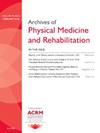Cognitive Rehabilitation Improved Self-Reported Cognitive Skills in Individuals With Long COVID: An Observational Study
IF 3.7
2区 医学
Q1 REHABILITATION
Archives of physical medicine and rehabilitation
Pub Date : 2025-09-01
DOI:10.1016/j.apmr.2025.02.009
引用次数: 0
Abstract
Objective
To describe the effects of cognitive rehabilitation provided to patients with lingering cognitive difficulties or “brain fog” after coronavirus disease 2019 (COVID-19).
Design
Retrospective cohort study.
Setting
Outpatient rehabilitation setting.
Participants
Seventy consecutive patients with Long COVID who were referred from a Neuro-COVID clinic and evaluated and treated by speech-language pathologists.
Interventions
Usual care cognitive rehabilitation.
Main Outcome Measures
Patients completed the Quality of Life in Neurological Disorders Cognition Function Short Form and the Rivermead Behavioral Memory Test Story Recall assessments before and after treatment. Demographics, goals, treatment frequency/duration, and interventions were analyzed to determine treatment outcomes and patterns of care.
Results
Of 70 patients, 83% were never hospitalized for COVID-19, the average age was 46.5 years, 77% were women, and 69% were White. There were no differences in demographics, race, ethnicity, or objective cognitive measures before starting treatment between the 50 individuals who completed their plan of care (POC) versus the 20 who did not. However, patients who did not complete their POC reported higher anxiety before treatment. Patients with higher anxiety before treatment demonstrated less improvement in cognitive quality of life measures after treatment. Of the 50 patients who completed their POC, 45 (90%) met all short-term goals. There was a significant increase in Quality of Life in Neurological Disorders Cognition Function scores from pre- to post- cognitive rehabilitation in 36 patients tested, but no significant differences in objective measures of memory in 23 patients tested.
Conclusions
Cognitive rehabilitation resulted in self-reported improvement in functional cognition. However, anxiety limited the favorable effect of treatment and should be addressed in conjunction with cognitive therapy to maximize outcomes.
认知康复改善了长COVID患者的自我认知能力:一项观察性研究。
目的:探讨新型冠状病毒肺炎(COVID-19)后认知困难或脑雾挥之不去患者的认知康复效果。设计:回顾性队列研究设置:门诊康复设置参与者:70例连续从神经-COVID诊所转介并由语言病理学家评估和治疗的长COVID患者干预措施:常规护理认知康复主要结局测量:患者在治疗前后分别完成神经系统疾病生活质量(NeuroQoL)认知功能简表和Rivermead行为记忆测试故事回忆评估。分析了人口统计学、目标、治疗频率/持续时间和干预措施,以确定治疗结果和护理模式。结果:70例患者中,83%未因新冠肺炎住院,平均年龄46.5岁,女性77%,白人69%。50名完成护理计划(POC)的患者与20名未完成治疗计划的患者在开始治疗前的人口统计学、种族、民族或客观认知测量方面没有差异。然而,没有完成POC的患者在治疗前报告了更高的焦虑。治疗前焦虑程度较高的患者在治疗后的认知生活质量改善较少。在完成POC的50例患者中,45例(90%)达到了所有短期目标。36例接受测试的患者在认知康复前和后的NeuroQoL认知功能评分显著增加,但23例接受测试的患者在客观记忆测量方面没有显著差异。结论:认知康复导致自我报告的功能认知改善。然而,焦虑限制了治疗的有利影响,应该与认知治疗一起解决,以最大限度地提高结果。
本文章由计算机程序翻译,如有差异,请以英文原文为准。
求助全文
约1分钟内获得全文
求助全文
来源期刊
CiteScore
6.20
自引率
4.70%
发文量
495
审稿时长
38 days
期刊介绍:
The Archives of Physical Medicine and Rehabilitation publishes original, peer-reviewed research and clinical reports on important trends and developments in physical medicine and rehabilitation and related fields. This international journal brings researchers and clinicians authoritative information on the therapeutic utilization of physical, behavioral and pharmaceutical agents in providing comprehensive care for individuals with chronic illness and disabilities.
Archives began publication in 1920, publishes monthly, and is the official journal of the American Congress of Rehabilitation Medicine. Its papers are cited more often than any other rehabilitation journal.

 求助内容:
求助内容: 应助结果提醒方式:
应助结果提醒方式:


